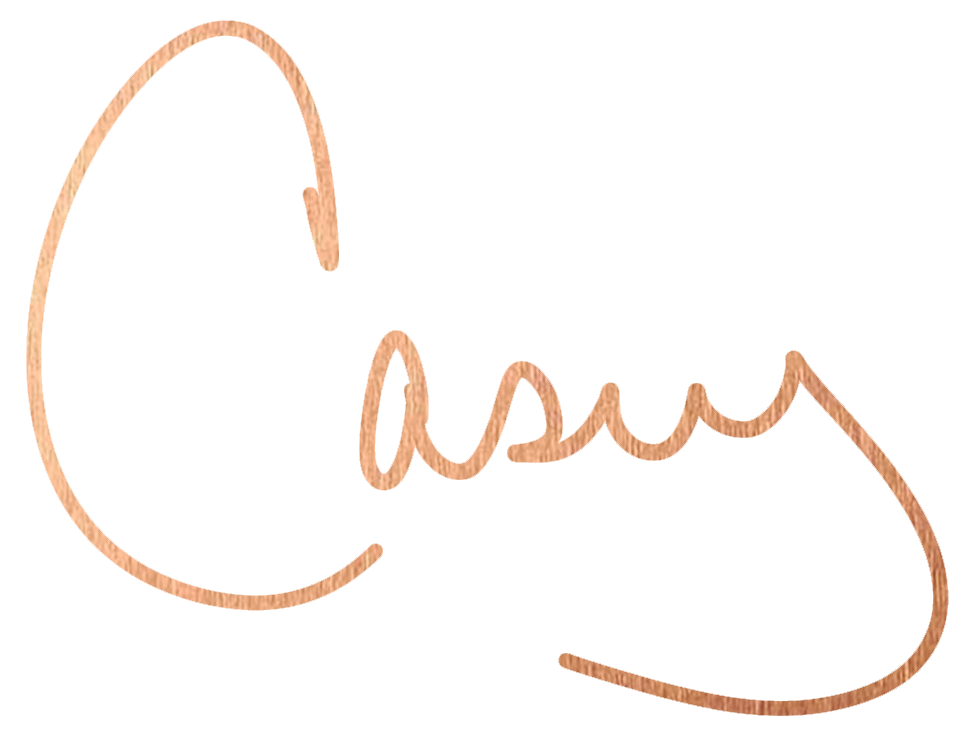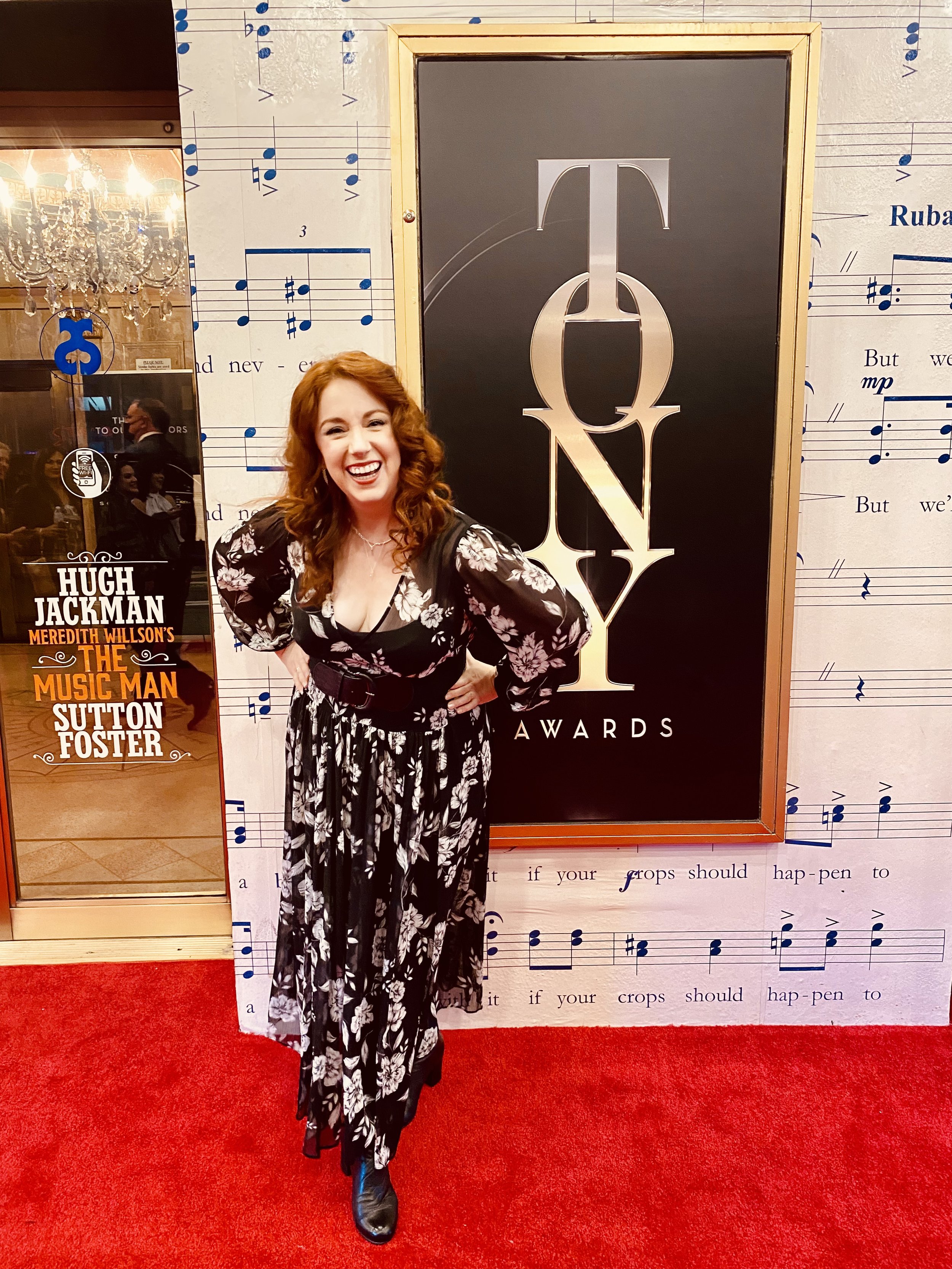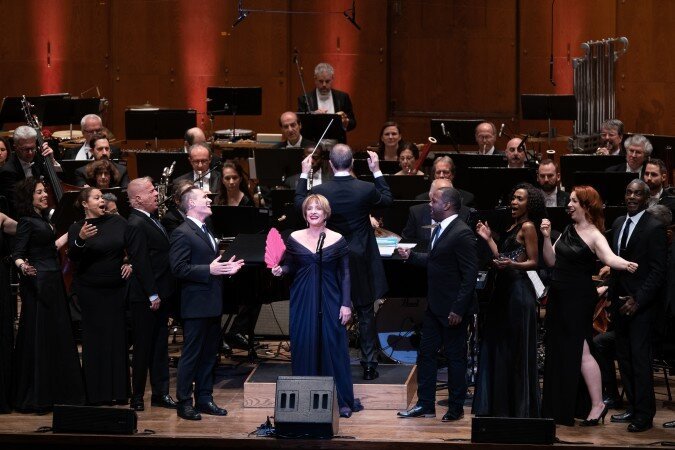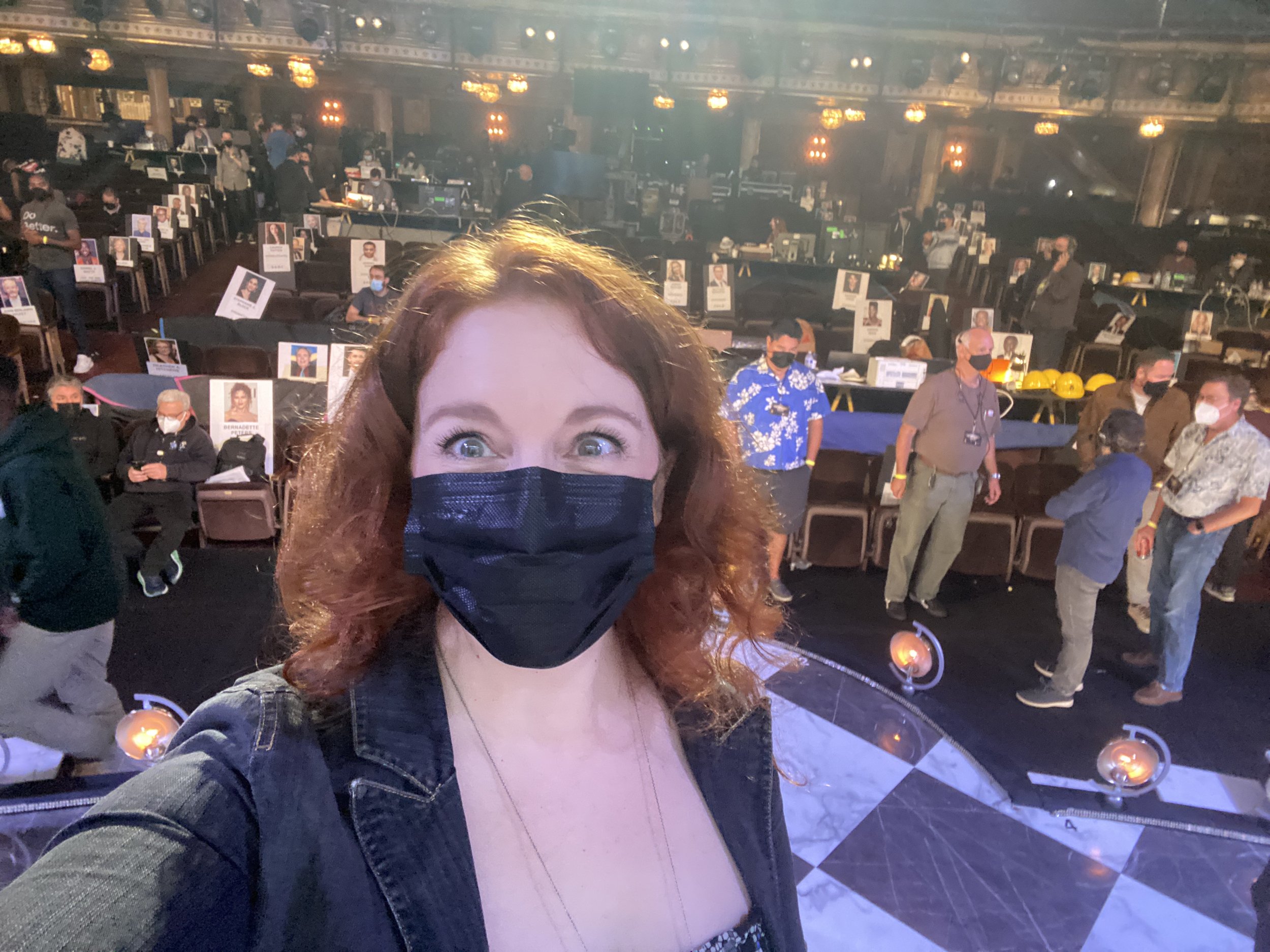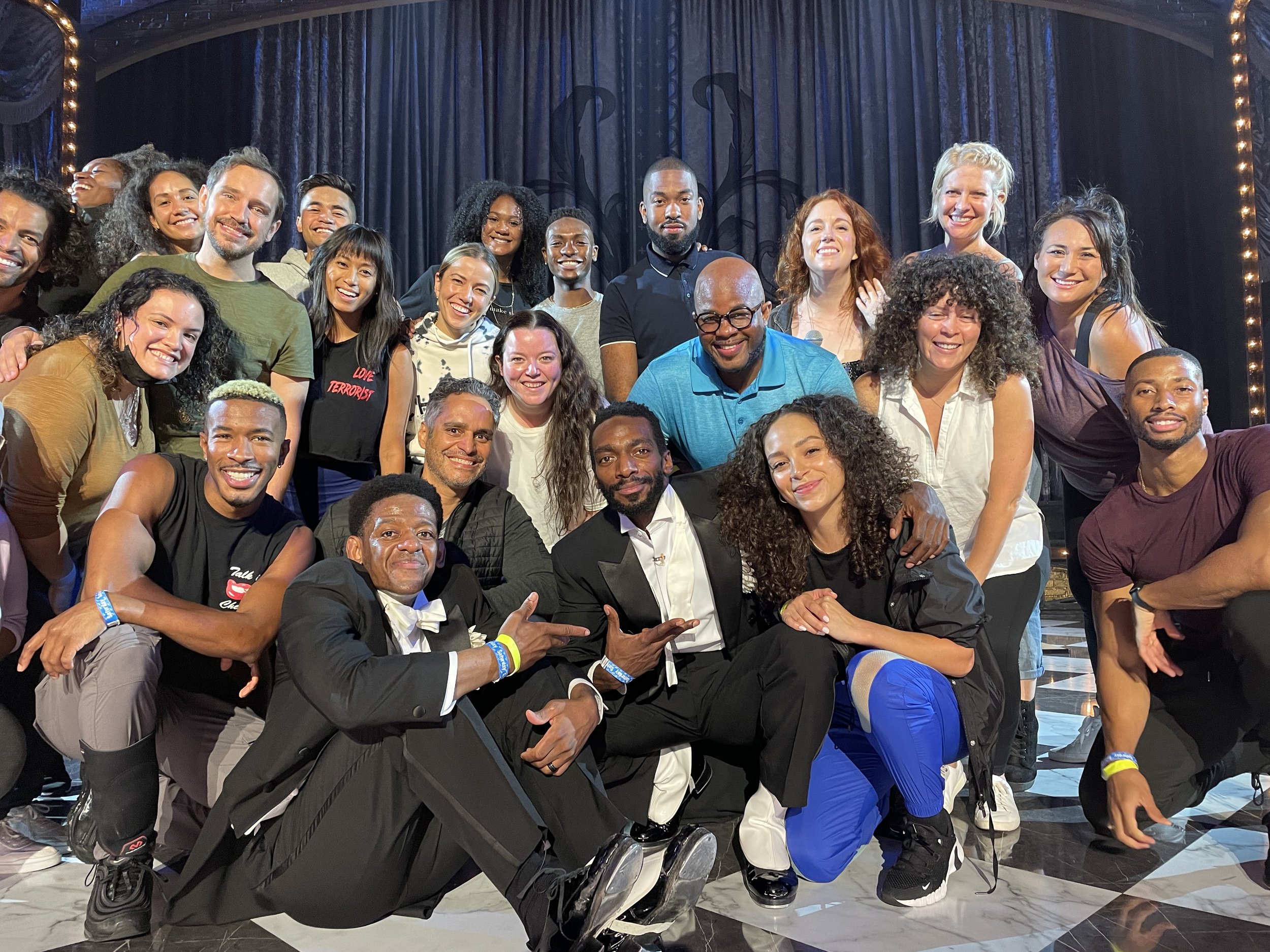How giving up on my dreams got me to the Tony Awards
It wasn’t how I expected singing on the Tony Awards to happen.
As a teenager (president of the Drama Club, naturally), as a college student working in summer stock theater, as the complete “small town girl moves to NYC to make it on BROADWAY” cliche, I probably dreamed that I’d be performing with my Tony-nominated show. Maybe I’d even be nominated for Best Leading Actress!
Instead, it happened after I had more or less left the acting business.
For the last several years, while attending networking events in the Before Times or introducing myself at COVID-era Zoom happy hours for business women, I’ve referred to myself as a “semi-recovering professional actor.” It often gets a giggle. It also serves as a useful transition into talking about my beloved 7-year-old business, Vital Voice Training. There, I use the skills I gained on stages across North America and in my intensive BFA in musical theater to teach others how to use their voices with more confidence, power, and presence. Theater is a training ground for action. It gives language and frameworks for the murky soup of human communication. My co-founder Julie and I love untangling the mysteries of why we say what we say in the way that we say it, and helping companies build healthier communication cultures that center listening and give space for authentic expression. I’m so proud of what we built together and the people that we’ve worked with.
But the transition from the full-time pursuit of Broadway and professional acting to the life I lead now was not precisely easy. It meant letting go of a dream.
Or did it?
You see, theater (both the industry and the art itself) is a complicated dream to have. At different times in my life, I’ve compared theater to a religion, a cult, an abusive relationship . . . and in between those descriptors, the only thing I ever wanted to do. Because, you see, when you start your BFA in musical theater at any of the now hundreds of programs across the United States, chances are you’ll hear one of your professors say, “If you can imagine doing ANYTHING else with your life, do it.”
What they’re trying to express (in good faith, I believe), is that theater is hard.
The business is vastly oversaturated with talent. Jobs are few, far between, and often low-paying, even as they make ever-increasing demands on actors’ bodies, minds, hearts, and skill sets. Frankly, it’s a crappy way to make a living — and when you can, you’re expected to be grateful for the opportunity, even when the working conditions range from less than ideal to actively abusive. The numbers game — dozens, maybe HUNDREDS of people who are more than qualified for every job available — is against us.
Actors are expected to bare their souls onstage, but not “take it personally” when they hear toxic rhetoric about their bodies. They’re expected to perform through extreme fatigue, illness, and injury. Only very recently have intimacy coordinators become the norm on Broadway — at smaller theaters around the country, actors are still expected to touch, kiss, and simulate sex with other actors, sometimes with almost no guidelines or guardrails in place for safety and consent. While fight choreography has been the norm for a while, actors still deal with directors and fellow actors who value “verisimilitude” over safety, sometimes to truly terrifying extremes. Knowing that there are dozens of actors behind you willing to “do what it takes” for the art leaves many afraid to advocate for themselves in these situations. No one wants to be labeled a Problem Actor.
And we’ve barely touched on the racism, sexism, ableism, sizeism, homophobia, and other profound issues of representation, equity, and inclusion that plague theater — the business and the art form. Thanks to the brave voices of marginalized folks and our nation-wide reckoning on many of these intersecting issues, we’re FINALLY seeing more productive conversation about the expectations, attitudes, practices, and abusive people that have harmed so many for so long. In the understatement of the century, there’s a lot of work to do.
Theater can also be absolutely transcendent. I’ll never forget the first time I heard my castmates in the 25th anniversary tour of Les Miserables sing together on day one of music rehearsal. There I sat, with my show binder and score in front of me, singing music that I’d loved since I was a kid, enveloped by a wave of sound that my voice was part of creating. It was spine-tingling. I felt it down to my BONES.
I’ve watched audiences be moved to riotous laughter and audible sobs. I’ve felt the magical connection described in a 2017 study from The University College London Division of Psychological and Language Sciences, which found that an audience’s heartbeats will actually sync up as they watch a performance together. Theater can uplift us, challenge us, and help us truly empathize with people who are nothing like us. As an actor, I’ve explored characters that unlocked parts of me I never knew existed, and that I now can bring into my daily life when needed. The sheer pleasure I get from the act of singing — by myself and with others — never ceases to thrill me. I love interpreting the words and music of other brilliant artists. Theater is the ultimate collaborative art, and there are magnificent humans out there creating art I long to be a part of. Telling stories can change the world.
It’s almost enough to make you overlook all the bad stuff. We make magic, in spite of — and sometimes even because of — pain and trauma. (Don’t even get me started on the trope of the Tortured Genius.) We are artists above all.
So yes . . . young actors often hear “If you can imagine doing anything else, do it.” They also hear things like "never have a plan B": which often translates to “even though you may never make 12 months of rent doing shows and will need to have a support job, don’t pick anything too demanding or that you might (gasp) enjoy doing, because if you do, you’ll probably quit theater.”
I remember the first time I judged the Kennedy Center American College Theater Festival’s musical theater competition. Surrounded by the bright-eyed, mega-talented students who were the future of our industry, I was having a blast working with them as a coach on interpreting their songs. At the same time, I was extremely conscious that my fellow judge was a Serious Broadway Guy who had associate-choreographed with bold-faced names. I was still auditioning at that point, and I wanted him to know that I was not “just” a teacher. One night, after a day of coaching our competition finalists, we sat down to dinner.
“You’re REALLY good at this,” he said to me. I blushed and thanked him, told him I loved it, told him I really enjoyed working with him. Then he leaned in, very seriously: “Have you ever considered that this is what you are meant to do?”
Oh my god, I thought. He thinks I shouldn’t be an actor. I was heartbroken. It didn’t even occur to me in that moment that A) just because I’m good at teaching doesn’t mean I can’t also be good at acting, or pursue acting, and B) even if it did, he’s one guy. That was one person’s opinion. He’d never even seen me perform! How was he to know anything about my acting skills or artistry? But of course, I’d heard (and apparently internalized) the phrase “those who can’t do, teach” enough times that I couldn’t hear the compliment.
Theater, we are told, wants our exclusive devotion.
We must eat, sleep, and breathe our art. When theater breaks your heart, when rejection batters your self-confidence, when saying yes to that gig means missing your grandma’s funeral or your brother’s wedding, when you’re told for the dozenth time that “they just don’t know what to DO with you—you can either lose weight or gain weight, but you can’t be THAT” . . . you pick yourself up, dust yourself off, make the sacrifices that the business demands of you, and remind yourself that you’re so lucky to be doing what you love. And you DEFINITELY don’t fall in love with something else.
Except that I did.
I started Vital Voice Training for many reasons . . . after leaving the Les Mis tour, I needed a way to make money, and I didn’t want to go back to temping or tour guiding or passing out souvenir Disney on Broadway fans to tourists in Times Square. I already loved working with singer-actors, but I fell backwards into speech coaching for business folks. I loved the art of it, but hated the company I was working for. A few months later, I met a woman who shared my frustrations with the state of public speaking and voice coaching — the old-fashioned “put on your serious voice to be taken seriously” standard — and we started a business together.
At roughly the same time, I was in final callbacks for a Broadway show. Intellectually, I knew that the numbers game was still against me, but in my heart of hearts, I truly believed that this was it. The Broadway debut. The lifelong dream was finally going to happen! And then . . . it didn’t.
Not booking the show that felt so close and so right? It broke me for a while. I fell out of love with the theater business. And while building Vital Voice Training, I fell in love with entrepreneurship, and with our mission to amplify “authentic voices, authentic presence, and authentic power.”
For the first time in my professional life, I was the one “in charge”. I didn’t have to ask anyone for work; I was making my own. It was hard, I had no idea what I was doing much of the time, but we had extremely satisfied customers and some serious momentum, and I truly LOVED the work I was doing. I even got to be in front of audiences! Instead of singing someone else’s music and lyrics, I was presenting ideas that my co-founder and I came up with together.
Getting up at the crack of dawn to stand in line for an audition where the decision-makers behind the table seemed barely interested at best no longer appealed to me. I still went to acting class, where suddenly, instead of picking “appropriate” songs for auditions and wondering what a casting director was going to think of my choices, I sang whatever I wanted. Freed from the subconscious desire to please others and “get the job”, I was doing the best artistic work of my life.
But every once in a while, I’d see a friend book a show and feel that twinge of jealousy. I’d hear the score of a new musical and long to be singing those songs center stage again. I’d wonder . . . had I just GIVEN UP?
Was I just another failed actor, settling for something else because I couldn’t hack it in showbiz? The answer has taken a few years to settle in.
I didn’t “give up” on my dreams . . . I gave up on an old idea of how I had to go about achieving them. I gave up on Broadway and Broadway alone as a magical pinnacle of artistic achievement. I gave up on an idea I now consider to be (and teach as) toxic . . . that the only way to be a Real Artist is to give your art your undivided loyalty and attention.
In the past 18 months, as I watched the theater industry shutter completely, I’ve been so grateful to have those wider dreams and plans and pursuits in place. I saw what my fellow artists went through when the art they gave everything to was no longer within reach. If I had not already believed whole-heartedly that the Myth of How to Be a Real Artist was toxic, this would have proven it.
As my dreams got bigger and more expansive, so did my life. I want this for every artist . . . to know that they can pursue art in whatever way they choose, from weekend hobby to full-time profession, and call themselves a Real Artist.
After all the soul-searching and angst (and in the fulfillment of another cliche), about the time I felt at peace with no longer “pursuing” the business, the business came back to me. A friend of mine asked me to sing backup vocals for a concert. During one of our rehearsals, he asked me why I wasn’t part of the Broadway Inspirational Voices.
“I can be part of the Broadway Inspirational Voices??” I asked him, incredulous and hopeful. “I thought you had to be . . . on Broadway?” Nope, he said. He asked me to forward my resume and a couple of youtube videos of me singing, and said he’d introduce me to the founder and artistic director, Michael McElroy.
Casey singing backup with fellow BIV members for Patti LuPone with the NY Philharmonic at Lincoln Center
That was three years and 8 months ago. Since then, BIV has brought so many wonderful humans and incredible experiences into my life. I’m one voice in the midst of a wave of sound again, singing with the most talented artists I’ve ever known. And in addition to thrilling performance opportunities, we also get to serve the wider community through organizations like the Covenant House and the Ronald McDonald House, helping out under-resourced arts programs in schools, and more. I’m so honored to be a part of their mission.
When we got the news about the Tony performance, my inner 15-year-old theater nerd fully flipped out.
Rehearsal at the Winter Garden Theater
I sat there at rehearsal this past weekend surrounded by the Broadway legends that I’d grown up idolizing. The added poignancy of this “COVID times” ceremony meant that every emotion was heightened for all of us. The broadcast itself was like being shot out of a cannon: striding onstage with my handheld mic, surrounded by incredible dancers and the voices and smiles of my fellow choir members, hearing Daniel J. Watts’ stirring call to action, seeing the bright lights and the sea of masked faces in the audience, taking in the applause afterwords . . .
After our performance, we left the Winter Garden and headed to a theater bar in midtown where they were showing the rest of the ceremony. It was a bit like watching the Super Bowl with rabid football fans, except instead of cheering touchdowns, we were belting along with the songs, screaming for Titus Burgess and Adam Pascal and Idina and Kristin and AUDRA and STOKES and our fellow BIV member Aneesa Folds, center stage with Freestyle Love Supreme. I was back in the center of this problematic, messed up, heartfelt, joyous, imperfect but striving industry and art form, on my terms. And this week, I’m working on the business that I built and with the clients I love. Because I can do both.
The company of “What Does Your Silence Sound Like?” at staging rehearsal at the Winter Garden Theater
Whatever future I have as a performer, as a coach, as a writer, as an entrepreneur, as an artist, I’m ready to explore and build and learn and create. I’m here to amplify the voices of others, and to let my own voice ring out in song and speak the ideas that come from my mind and heart.
